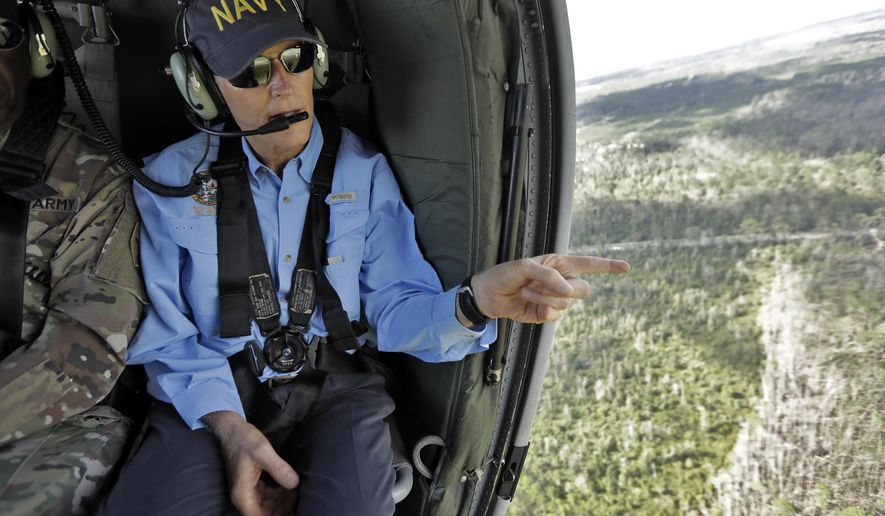A Minnesota professor says Florida hurricane victims are paying the price for electing Gov. Rick Scott, a Republican who “denies climate change.”
John Abraham, thermal sciences professor at the University of St. Thomas School of Engineering, said in a Thursday op-ed that the states hardest hit by Hurricane Michael, the destructive Category 4 hurricane, are led by “climate deniers” such as Mr. Scott.
“It is climate denial like his that has contributed to the suffering of residents in the state,” said Mr. Abraham in his column for the Guardian.
He also blasted Georgia Sens. David Perdue and Johnny Isakson, both Republicans, for supporting President Trump’s decision in June to pull out of the Paris climate accord, the 2015 non-binding agreement aimed at reducing the increase in global warming.
“[E]lections have consequences and if we as a society want to create a better world and reduce climate change, we have to vote for people who understand science, who believe in facts,” said Mr. Abraham.
“Climate deniers are making these storms worse by stopping action on climate change,” he continued. “What the hell do we expect to happen when the deniers are writing the laws?”
The column, “Victims of Hurricane Michael are represented by climate deniers,” drew a heated response from Tim Huelskamp, president of the free-market Heartland Institute, who tweeted that the Guardian “should be ASHAMED [by] their lie that voters who elected climate skeptics are responsible for hurricanes.”
“Using the pain and suffering of a natural disaster to float your radical politics is exactly what America rejected in 2016,” said Mr. Huelskamp, a former Republican congressman.
The @Guardian should be ASHAMED their lie that voters who elected climate skeptics are responsible for hurricanes. Using the pain and suffering of a natural disaster to float your radical politics is exactly what America rejected in 2016. #Climate #MAGA https://t.co/MDL2KYpLkV
— Tim Huelskamp (@CongHuelskamp) October 12, 2018
Climate Depot’s Marc Morano pointed to the recent 11-year gap in major hurricanes making U.S. landfall, which ended in August 2017 with Hurricane Harvey, the longest such “hurricane drought” in recorded history.
“If they want to blame Republican policies for recent hurricanes, will they also credit the GOP for the more than a decade lull in hurricanes?” he asked. “We have reached the level of inane belief that government regulations and taxes can influence storms.”
Mr. Abraham argued that Hurricane Michael “strengthened because it passed over really warm waters,” which he said were “hotter because of human-caused warming,” although others have disputed the link between catastrophic hurricanes and rising atmospheric carbon dioxide.
University of Alabama at Huntsville meteorologist Roy Spencer posted a plot Thursday of major Florida hurricane strikes since 1900, including Hurricane Michael, “and the result is that there is still no trend in either intensity or frequency of strikes over the last 118 years,” he said.
“Nevertheless, the usual fearmongers are claiming Hurricane Michael is somehow tied to climate change,” said Mr. Spencer on his Global Warming blog.
University of Colorado Boulder environmental studies professor Roger A. Pielke Jr., author of “The Rightful Place of Science: Disasters & Climate Change,” pointed to the latest report by the UN Intergovernmental Panel on Climate Change, which was released Monday.
The panel “once again reports that there is little basis for claiming that drought, floods, hurricanes, tornadoes have increased, much less increased due to GHGs [greenhouse gases],” he tweeted.
IPCC reports low confidence in the idea of more intense hurricanes: “There is consequently low confidence in the larger number of studies reporting increasing trends in the global number of very intense cyclones”
— Roger Pielke Jr. (@RogerPielkeJr) October 11, 2018
Here’s the data to back that up pic.twitter.com/NaOoADDrpb
In his op-ed, however, Mr. Abraham insisted, “We know that climate change is making these storms stronger.”
He urged voters to support Sen. Bill Nelson, Florida Democrat, who’s being challenged by Mr. Scott, saying Mr. Nelson “understands science and believes in facts.”
Marine Conservation Institute lobbyist Michael Gravitz sounded a similar theme Thursday, referring to allegations in a 2015 article that Mr. Scott banned the words “climate change” from state communications, which he has denied.
“Brilliant voters down there,” he tweeted. “Need more hurricanes to wake them up.”
Yeh, and Floridians could go to the polls on November 6 and elect Governor Rick Scott to the Senate, the same Rick Scott who banned state employees from uttering or writing the words ’climate change’. Brilliant voters down there. Need more hurricanes to wake them up. https://t.co/rd56ggDueO
— Michael Gravitz (@marinelifemike) October 11, 2018
Mr. Abraham was more sympathetic, saying he hoped the victims stayed safe, whatever their views on global warming.
“I pray that people heed warnings and get out of the way,” he said. “I hope people stay safe, regardless of their understanding of climate change and its effect on storms.”
• Valerie Richardson can be reached at vrichardson@washingtontimes.com.




Please read our comment policy before commenting.